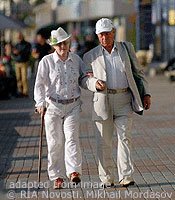Russian retirement: mixed outlook for 2013

(Moscow News – themoscownews.com – Anastasia Matveyeva, Moskovskiye Novosti – January 21, 2013)
New calculations for pensions and a funded component, a possible luxury tax and a special structure that will come to manage Russian currency reserves are the main economic events that are expected in the coming year. How will these reverberate on us, and what will they will bring or take away?
In March, a new pension formula is to be published, an algorithm on whose basis future pensions will be calculated, taking into account a worker’s length of service and salary. The Labor and Social Welfare Ministry should develop it, but the task was assigned by President Vladimir Putin.
The need for this became evident after the ministry announced the principles of the new pension system in the summer. The project inspired fierce arguments, including the intention to limit and, possibly, cancel altogether the funded portion. Currently the reform stipulates that the rate of funded deposits in the Pension Fund from 2014 will decline from 6 percent from the salary fund to 2 percent, the remaining 4 percent going into an insurance part a “general pot” on current payments. For those who invest pension savings in non-state pension funds or private management companies, the current rate is preserved, but for this they should specially give notice of their decision.
The future of the pension system is the most significant question of the economy in 2013, considers Yevgeny Gavrilenkov, main economist of Sberbank CIB.
“There were very contradictory messages coming from the government: on one hand, the government firmly made it understood that it would store resources in the reserve fund, in order to prepare for a future crisis, but on the other hand, people were shown: storing funds in the pension system is less proper for you, because the funded system did not justify itself,” he said.
For investors this was a warning of uncertainly.
“For the first time, we now had a positive real rate on the financial market,” Gavrilenkov said. “And only just after these 10-12 years conditions arose in which it was possible to store funds in a funded system, which they have suddenly, abruptly, decided to reduce, eliminate.”
The theme of pension reform is highly important both from a macroeconomic and from a social point of view.
“For millions of future pensioners, the numbers of which are going to grow, it is important to understand what’s waiting for them,” Gavrilenkov added.
Luxury tax
In 2013, the popular idea of a luxury tax should finally come to fruition in legislation. Putin has ordered the government to bring corresponding bills to the State Duma before June 1. The decision should concern expensive cars, as well as high-end real estate.
Reportedly, the tax will affect vehicles of a value greater than 3 million rubles independent of engine size or level of horsepower. They plan to introduce the tax on expensive real estate on a regional level, based on a property’s recorded value, providing for an increase in the tax rate in relation to property whose summary recorded value exceeds the specified limit. The tax’s rate, however, has not been established.
G-20 chairmanship
In 2013, Russia took on the chairmanship of the G-20, whose summit will be in St. Petersburg on Sept. 5 and 6. The leaders of the G-20 will discuss the situation in the world economy and questions of the prevention of debt crises. Among the priorities of the Russian chairmanship are the stimulation of economic growth, investment, transparency and effective regulation.
Stimulation of growth looks to be a complex problem in the conditions of a recession in the euro zone and instability on world markets. And here the role of decisions in the framework of the G-20 cannot be definitive, notwithstanding the status of the club of leading world economies, which is looking far more representative than the summits of the G-8.
“Strictly, the G-20 does not manage anything it’s a club for discussion,” Gavrilenkov said. “Concrete decisions, seriously influencing the world economy, are taken either by the board of the Federal Reserve, or at the European Central Bank.”
Privatization of VTB
The government will continue the program of privatizing state companies. VTB is in line: 25.5 percent minus one share of the country’s second-largest bank, after Sberbank, will be sold. The first 10 percent of the state’s package in VTB was sold in February 2011 and brought 95.7 billion rubles into the state treasury, more than expected.
The government currently holds 75.5 percent, and a full exit from the bank’s capital has been slated for 2016. It is possible that the size of the share packet set out for sale will be increased in any case, Deputy Prime Minister Igor Shuvalov has spoken about the readiness of the Cabinet for negotiations with investors.
“Everything will depend on developments in the euro zone,” said Konstantin Styrin of the Russian Economic School. “If they follow a negative scenario, then global investors will not risk, and then setting out a large packet of VTB shares will not be very justifiable.”
Other news for the coming year will be the formation of a Russian Financial Authority by April 1, according to a presidential order, and the appointment of a new chief of the Central Bank.
